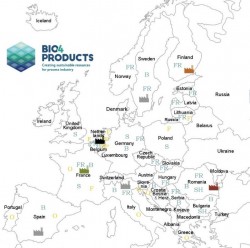Bio4Products Shows Potential For New Biorefineries in Four European Locations
Lead authors Capax Biobased Development first researched the total availability of selected biomass feedstocks in EU Member States, focusing on lignocellulosic by-products and residues. Based on the results of this analysis, and additional factors such as sustainability, logistics and opportunities for industrial symbiosis, four ‘virtual’ plant locations were identified, with high potential for hosting a pyrolysis plant: - Bergen op Zoom, the Netherlands. Feedstock: Poplar (Short Rotation Coppice and phytoremediated poplar) - Marne region, France. Multi-feedstock: Wheat straw, Flax shives, Forestry chips (hardwood), Poplar wood slabs (sawmill residues) - South Karelia region, Finland. Feedstock: Forestry residues (softwood) - Moldova region, Romania. Feedstock: Sunflower husks Each of the four locations has sufficient biomass available within a 100-150 km radius to sustain a typical 5 tonne/hour commercial plant. The report also includes information on the local biomass supply chains, investigating quality, seasonality and competitive usage of the selected biomass feedstocks. Today there are just two commercial fast pyrolysis plants in Europe, in the Netherlands and Finland. The Dutch EMPYRO plant produces electricity, process steam and fuel oil from woody biomass. Within the Bio4Products project, BTG Biomass Technology Group are demonstrating how the main product of fast pyrolysis – a bio-oil – can be separated into pyrolytic lignin and sugars. The lignin and sugar are renewable chemical intermediates that can be used to substitute fossil materials such as bitumen, phenols and creosote, in end products including roofing materials, resins and wood modification. Industrial partners in the project are reporting positive initial results, and it is hoped that new bio-based products could hit the market soon after the project closes in 2020. You can download the full report here: https://bio4products.eu/knowledge-transfer/(opens in new window) Learn more about the Bio4Products project at: www.bio4products.eu
Keywords
Countries
Belgium, Finland, France, Netherlands, Romania



